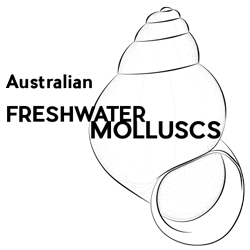
G. hesperus differs from other Gyraulus in its high, rounded and obtusely angled whorls and strong spiral sculpture.
Gyraulus (Gyraulus) hesperus (Iredale, 1943)
Class Gastropoda
Infraclass Heterobranchia
Megaorder Hygrophila
Order Lymnaeida
Superfamily Planorboidea
Family Planorbidae
Subfamily: Planorbinae
Genus Gyraulus Charpentier, 1837
Original namel: Glyptanisus hesperus Iredale, 1943. In Iredale, T. (1943). A basic list of the freshwater Mollusca of Australia. Australian Zoologist 10: 188-230.
Type locality: Lennard River, north Western Australia.
This species lives in water weeds and other vegetation in ponds, billabongs, swamps and sluggish streams and rivers in monsoonal northern and western Australia. Feeds on detritus. Egg mass presumably a jelly strip containing small eggs. Development direct.
Brown (2001) described the anatomy of this species.
Tropical northern Australia from the central coast of Queensland to the central coast of Western Australia.
Brown, D. S. (1981). Observations on the Planorbidae from Australia and New Guinea. Journal of the Malacological Society of Australia 5: 67-80.
Brown, D. S. (1998). Freshwater snails of the genus Gyraulus (Gastropoda: Planorbidae) in Australia: the taxa of Tasmania. Molluscan Research 19: 105-154.
Brown, D. S. (2001). Freshwater snails of the genus Gyraulus (Planorbidae) in Australia: taxa of the mainland. Molluscan Research 21: 17-107.
Hubendick, B. (1955). Phylogeny of the Planorbidae. Transactions of the Zoological Society of London 28: 453-542.
Smith, B. J. (1992). Non-marine Mollusca. Pp. i-xii, 1-408 in W. W. K. Houston. Zoological Catalogue of Australia, 8. Canberra, Australian Government Publishing Service.
Willan, E. C. & Kessner, V. (2021). A conspectus of the freshwater molluscs of the Daly River catchment, Northern Territory. Northern Territory Naturalist 30: 108-137.